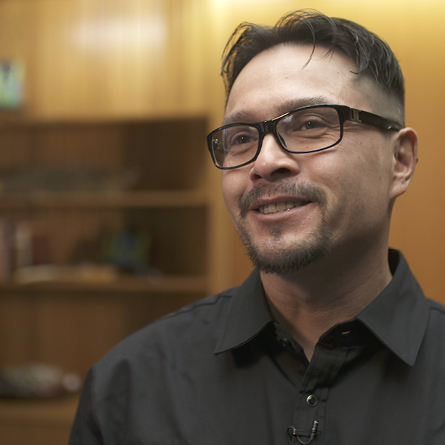Indigenous welder forges a new career helping others

Lucien Ledoux, helping others find their voice through meaningful employment.
"I would never consider myself a success story, but when I look back to where I came from and where I am today, it's undeniable that there's been tremendous growth," says Lucien Ledoux, the Workforce Development Officer for Working Warriors and Running Deer Resources in Winnipeg, Manitoba.
Originally from the First Nation community of Pine Creek, Manitoba, Ledoux grew up in the northwestern Ontario community of Wabigoon. He was raised by a single mother after his father passed away when Ledoux was 12.
Ledoux had his share of struggles. Then a visit to a Service Canada Centre changed everything when the employment counsellor referred him to the Centre for Aboriginal Human Resource Development (CAHRD). CAHRD is an Aboriginal Skills and Employment Training Strategy (ASETS) partner and a non-profit human resource development organization that delivers education, training and employment services to the urban Indigenous population of Winnipeg.
"CAHRD is a great organization, and ASETS has been crucial to developing people and the skills that allow them to better themselves. For me, it was life-changing."
A welder by trade, Ledoux originally wanted to build custom motorcycles, but a work trip to Thompson, Manitoba, had a profound impact on him. Lucien says he gave money to someone asking for spare change on the street. An onlooker argued that he was just "causing a problem."
A meeting the next day promoting the Indigenous Apprenticeship program and benefits for residents from surrounding communities through job shadowing and certification programs resonated with him.
"I went from being a welder to a liaison officer and then became a workforce development officer to try to find meaningful employment for individuals so incidents like this would never happen again."
"There's help out there if you want to better yourself. All you need to do is look and the rest is up to you. Through time, I have found something more fulfilling: engaging with Indigenous peoples and helping them to better themselves."
Ledoux feels strongly about helping young people reach their goals. "To provide a means for Indigenous youth to have a voice that will be heard and to provide a place where they belong is paramount for not only this generation, but future ones as well."
In May 2019, after engagements with Indigenous groups, ASETS was replaced by the new Indigenous Skills and Employment Training (ISET) program. The new program has 4 distinct labour market strategies: First Nations, Inuit, Métis and urban and non-affiliated Indigenous people. The Government of Canada and Indigenous partners are working together to reduce the skills gap between Indigenous and non-Indigenous people by 50%, and the employment gap by 25%. Since it began, ASETS has served 481,000 clients, with more than 159,000 finding jobs.